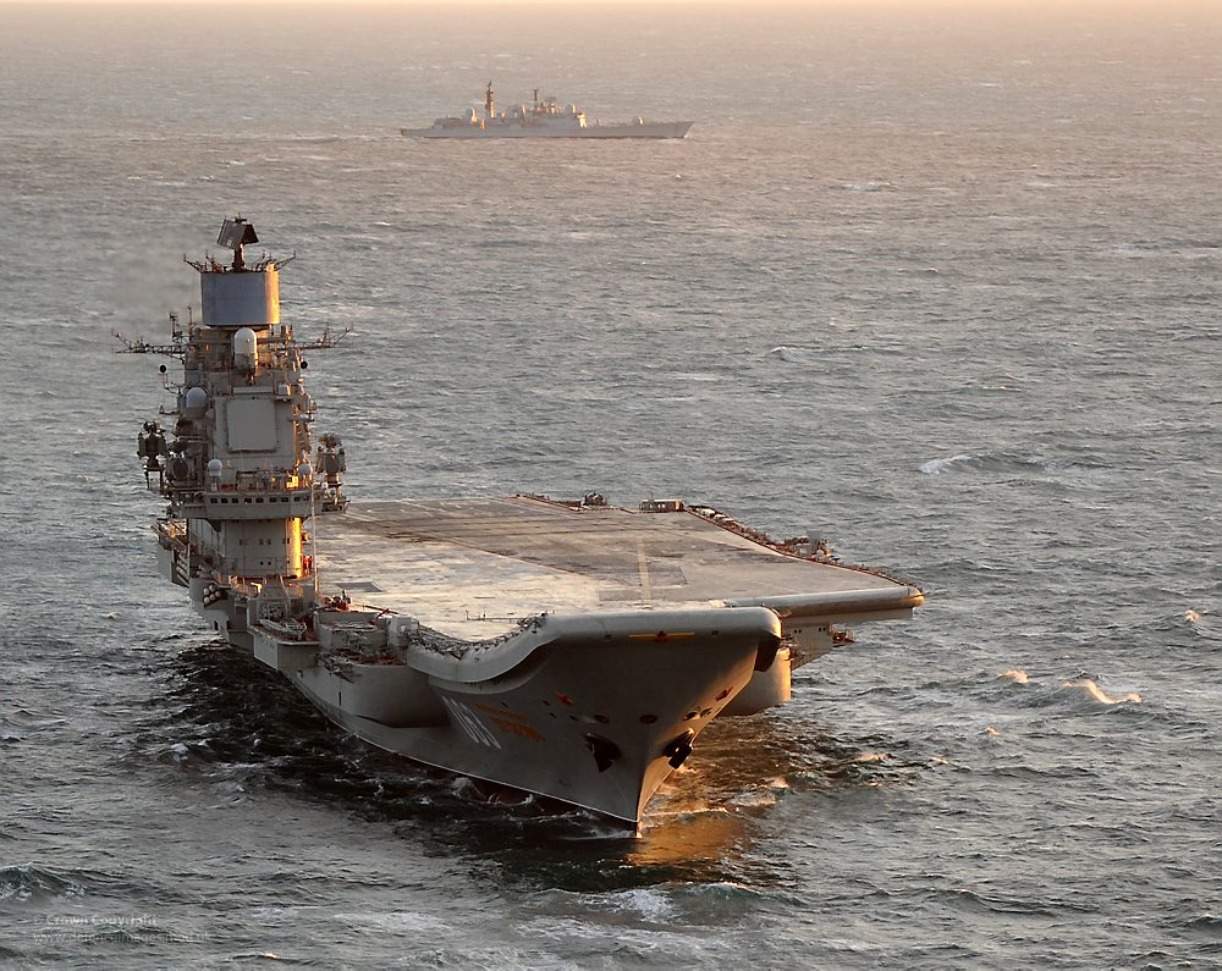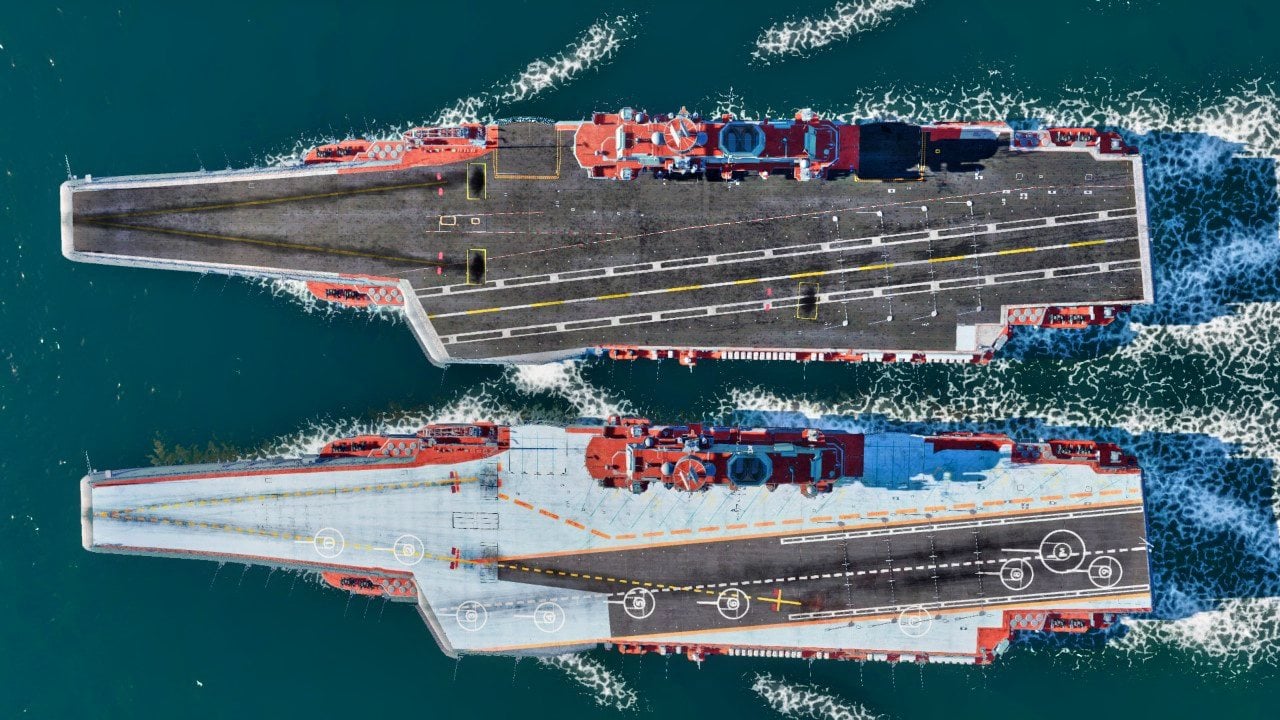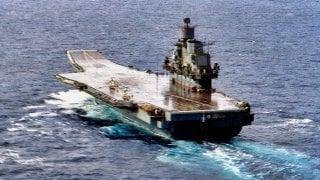Russia's Admiral Kuznetsov Aircraft Carrier: Summed Up In 3 Words
Russia's only aircraft carrier, the Admiral Kuznetsov, has long been an embarrassment for the Russian Navy. Currently rusting in drydock with its crew sent to the Ukrainian frontlines, there's talk of finally mothballing the troubled ship.
Headed for Retirement: Russia's only aircraft carrier, the Admiral Kuznetsov, has long been an embarrassment for the Russian Navy. Currently rusting in drydock with its crew sent to the Ukrainian frontlines, there's talk of finally mothballing the troubled ship.

-Plagued by poor craftsmanship, outdated systems, and environmental issues like belching thick black smoke due to its Mazut fuel, the carrier has faced problems since its inception during the Soviet Union's final years. Notably, during its deployment in the Syrian Civil War, the U.S. Navy monitored it—not out of fear, but anticipating it might sink.
-Despite its flaws, the ship symbolizes Russia's tenacity in pursuing naval ambitions, reflecting Putin's determination to restore national greatness, even through questionable decisions.
Admiral Kuznetsov: The Troubled Tale of Russia's Only Aircraft Carrier
Russia’s only aircraft carrier, the Admiral Kuznetsov, is one of the most enduring embarrassments that the Russian Federation has subjected itself to for years. Today, it sits in drydock, its crew sent to the frontlines of Russia’s bloody war with neighboring Ukraine, and is rusting out. There is much talk both inside Russia and throughout the world that the Admiral Kuznetsov will finally be mothballed.
What the Russians are experiencing today with the Admiral K is nothing new. It’s not a byproduct of the carrier being decades old. Age has only worsened her problems. This boat has been a problem from the start.

Created in the final years of the once-mighty Soviet Union, hitting the High Seas at a time when the newly birthed Russian Federation was a zone of instability in the world, this ship never had a chance.
Still, the Russians keep it around because it is an aspirational symbol that the Russians will finally become an aircraft carrier power on par with the Americans.
To be fair, Admiral Kuznetsov was simply a training platform for the Russians to exercise some of their maritime muscles in ways that they were unable to since the end of the Cold War. It was all part of Putin’s overall mission to restore Russia’s lost national greatness, indeed, this has been Putin’s raison d’etre since taking power from Boris Yeltsin.
A Tired Old Ship
With each increased deployment since Putin took power, though, the warship took a beating simply because it was just such a bloody awful boat. Poor craftsmanship and Terrible crew conditions are only a few noticeable reasons on the surface. Subpar fighter capabilities, old systems, and to top it all off, his ship even belches thick, black smoke into the air, leaving a trail of soot miles in its wake, thanks to the Mazut fuel it uses! There’s nothing good about this boat.

One incident, in particular, stands out now that we are talking about the abject awfulness of this ship. That is during the warship’s deployment to the Mediterranean Sea during the height of the Syrian Civil War, Russia was supporting embattled Syrian strongman, Bashar al-Assad along with Iran.
Back in 2011, the U.S. Navy’s Sixth Fleet was trailing the historically terrible Russian warship. This was not because the Americans, as they did in the glory days of the Cold War, feared the Russian military’s prowess. Instead, it was because the Americans were convinced the warship was going to sink at any moment. The Sixth Fleet was ordered to track the carrier and be prepared to render aid whenever the ship eventually sank.
A Symbol of Russian Tenacity?
Shockingly, however, this warship never sank. It’s like the little engine that could. So, the Americans watched and waited. And this self-inflicted joke of a warship floated on, spilling toxic fuel into the pristine sea upon which it was traveling, belching black smoke miles behind it as if the boat were built by Orcs, and struggling to maintain basic power. Nevertheless, this decrepit carrier pressed on out of the U.S. Navy Sixth Fleet’s Area of Operation back to its homeport.
It was a darkly comical and disturbing reminder that, by hook or by crook Putin’s Russia was going to press ahead with any bad decision it deemed necessary.
Author Experience and Expertise: Brandon J. Weichert
Brandon J. Weichert, a National Interest national security analyst, is a former Congressional staffer and geopolitical analyst who is a contributor at The Washington Times, the Asia Times, and The-Pipeline. He is the author of Winning Space: How America Remains a Superpower, Biohacked: China’s Race to Control Life, and The Shadow War: Iran’s Quest for Supremacy. His next book, A Disaster of Our Own Making: How the West Lost Ukraine, is due October 22 from Encounter Books. Weichert can be followed via Twitter @WeTheBrandon.
All images are Creative Commons or Shutterstock.
From the Vault


